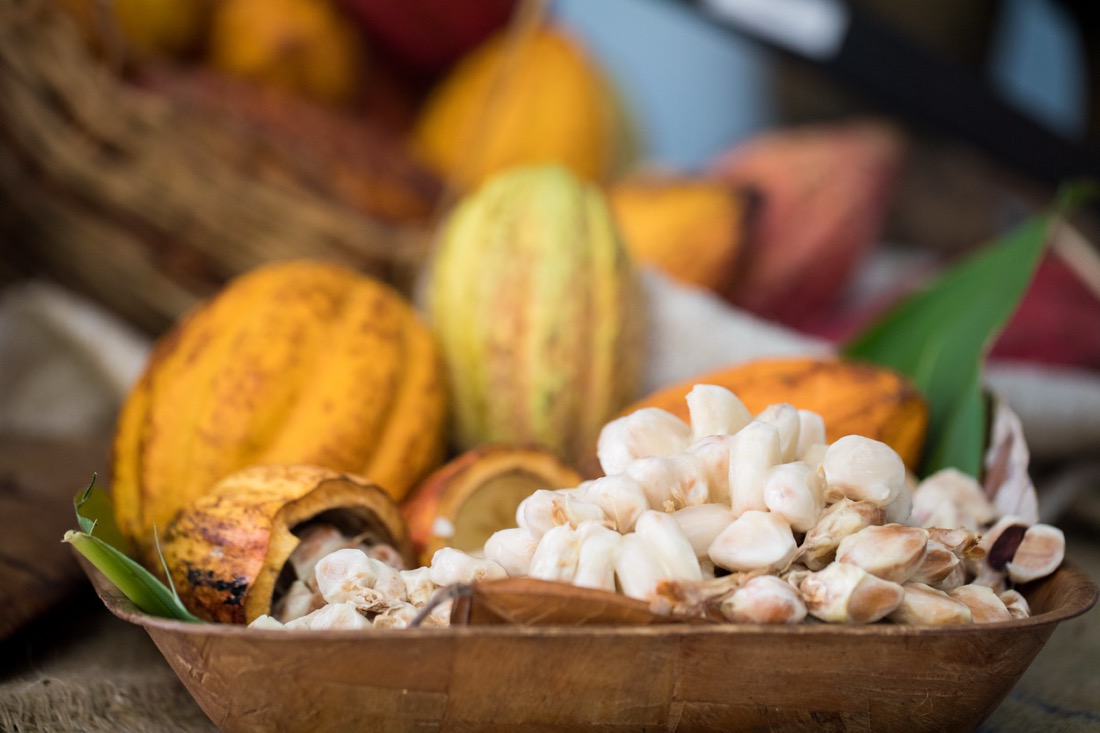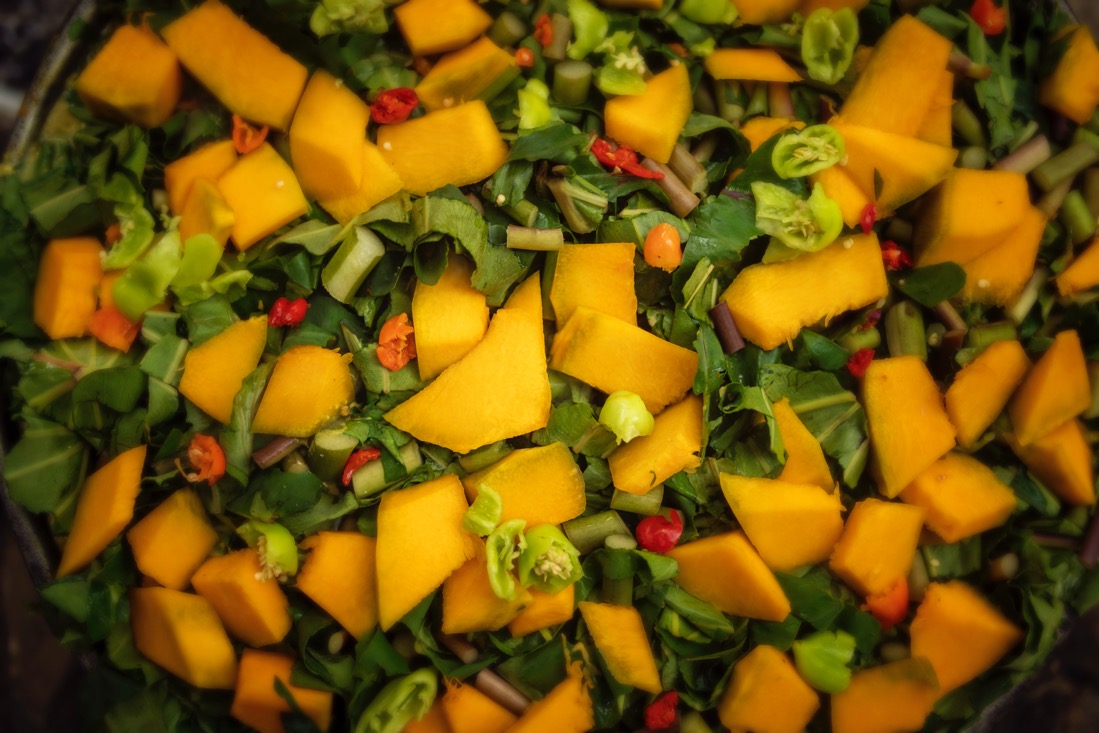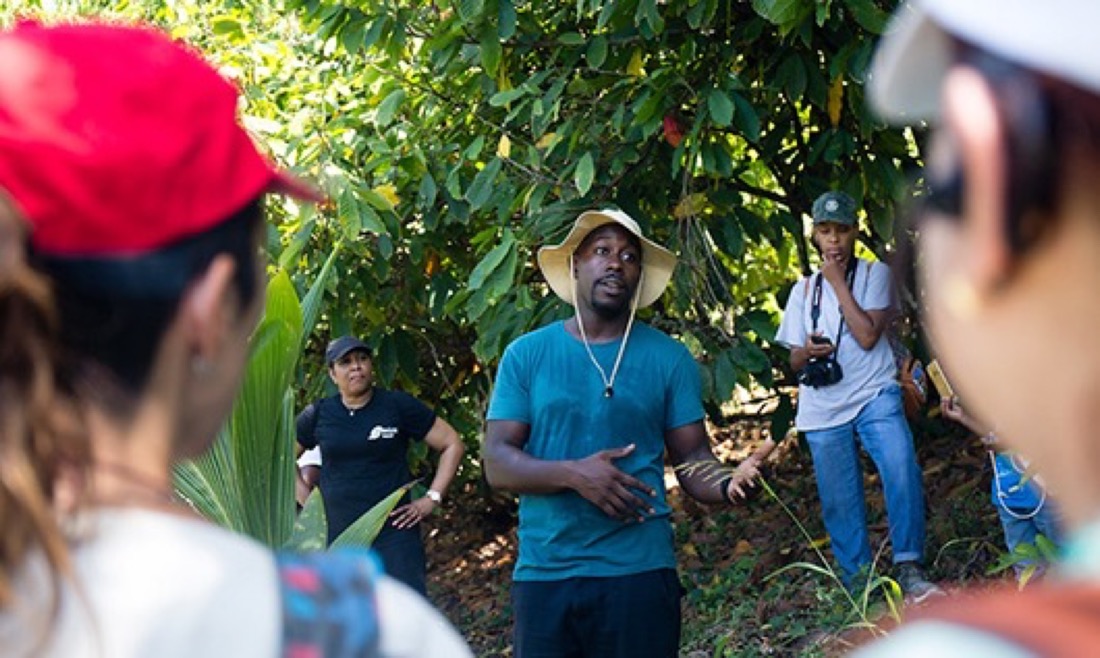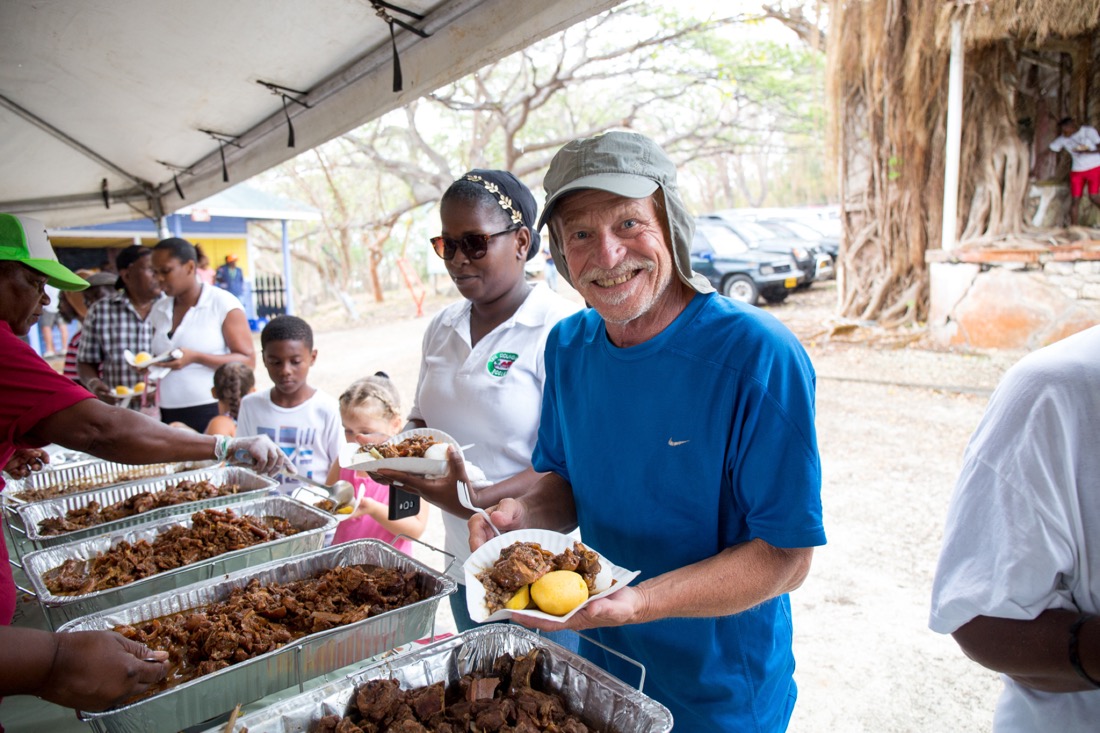Lessons You’ll learn
Introduction to Grenadian Cuisine
CULINARY FOUNDATIONS OF GRENADA
Grenadian cuisine is a vibrant fusion of Caribbean, African, and Indian influences, reflecting the island’s rich cultural mosaic. Central to Grenadian cooking is the use of fresh, locally sourced ingredients like seafood, tropical fruits, and, most importantly, spices. Nutmeg, known as the "gold of Grenada," is particularly significant and is incorporated into a variety of dishes, from savoury stews to sweet desserts. Other spices like mace, cinnamon, cloves, and ginger also play crucial roles, contributing to the complex flavors characteristic of the island's dishes.
SIGNATURE DISHES

Introduce some of Grenada's most beloved dishes to illustrate the practical use of these ingredients and spices. Oil down, considered the national dish, is a hearty one-pot meal made with breadfruit, coconut milk, turmeric, and a medley of other vegetables and salted meat or fish, all slow-cooked to absorb the rich flavours. Another popular dish is callaloo soup, a creamy, spicy blend made from callaloo leaves (similar to spinach), okra, crab, and coconut milk, showcasing the island's ability to blend diverse elements into a cohesive and flavorful dish.
CULTURAL SIGNIFICANCE

Discuss how these dishes are not just meals but are integral to Grenadian family life and celebrations, reflecting the island’s history and community values. Food preparation and consumption in Grenada often involve communal efforts and are a reason for gathering, reflecting the importance of kinship and community in Grenadian culture. Highlight how traditional cooking methods and recipes are passed down through generations, preserving and celebrating the island's culinary heritage.
ENGAGEMENT TIP FOR TRAVEL AGENTS

Emphasise the unique aspects of Grenadian cuisine when promoting travel packages to food enthusiasts. Highlighting the opportunity to experience traditional cooking classes or dine at local establishments where traditional techniques are still used can greatly enhance the appeal of Grenada as a culinary destination.
The Role of Spices in Grenadian Cooking
GRENADA'S SPICE HISTORY
Grenada has been a significant player in the global spice market since the 18th century, particularly renowned for its nutmeg and mace production. The introduction of nutmeg to Grenada from the Banda Islands in Indonesia marked the beginning of an era that saw Grenada become one of the world’s top nutmeg producers. This historical development not only shaped the island’s agricultural landscape but also its economic pathways, as spices became a major export commodity. The story of spices is woven into the national identity of Grenada, with nutmeg prominently featured on the national flag, symbolising its importance to the island's past and present.
CULINARY USES OF SPICES
In Grenadian cuisine, spices are used liberally to enhance both the flavor and nutritional value of meals. Nutmeg is used in everything from savoury dishes like soups and stews to desserts and drinks, including the famous Grenadian rum punch. Mace, which is the outer shell of the nutmeg, imparts a slightly more delicate flavor and is often used in baking and to flavour meat dishes. Other spices, such as cinnamon, cloves, and ginger, are also staples in the Grenadian kitchen, used to create rich, flavourful dishes that tantalise the palate and celebrate the island’s spice-rich heritage.
SPICE TOURS AND AGRICULTURAL IMPACT

Spice plantation tours are a significant aspect of Grenada’s tourism offerings, providing visitors with firsthand experiences of the spice cultivation and processing methods. These tours not only educate visitors about the traditional techniques used in spice farming but also highlight the modern challenges and advancements in sustainable agriculture. The spice industry continues to play a crucial role in Grenada’s economy, with many local families involved in farming and selling spices both locally and internationally.
ENGAGEMENT TIP FOR TRAVEL AGENTS
When promoting Grenada, highlight the unique spice-related experiences available to tourists, such as visiting nutmeg processing facilities or participating in cooking classes focused on the use of local spices. These activities offer a deep dive into the island's culture and provide unique, memorable experiences that resonate with culinary enthusiasts.
Traditional Grenadian Dishes and Cooking Techniques
KEY GRENADIAN DISHES
Introduce several staple dishes of Grenada that highlight the island's use of local ingredients and spices. Oil down, Grenada's national dish, is a must-mention, consisting of breadfruit, coconut milk, turmeric, and a mix of meats and other local vegetables, all slow-cooked in a large pot until everything melds into a delicious, hearty stew. Another important dish is the Grenadian roti, similar to those found in other Caribbean nations but unique in its use of local spices and fillings like curried lamb, chicken, or conch. Fish and seafood are also prominently featured in the Grenadian diet, often prepared grilled, fried, or curried, and served alongside provisions like yams, sweet potatoes, and dasheen.
TRADITIONAL COOKING TECHNIQUES

Highlight traditional cooking techniques that are essential to creating the authentic tastes of Grenadian cuisine. Cooking over open fires or in outdoor clay ovens is common in rural areas, adding a smoky flavour that is typical of many Grenadian dishes. The use of a "cocoa stick" to make the famous Grenadian hot chocolate is another traditional technique, where locally grown cocoa is dried, roasted, and rolled into sticks. This method imparts a rich, deep chocolate flavour that is inherently Grenadian. Discuss how these methods are not just about preparing food but also about preserving a way of life and fostering a sense of community.
CULINARY WORKSHOPS AND COOKING CLASSES
Mention opportunities for visitors to participate in culinary workshops or cooking classes that teach them how to prepare traditional Grenadian dishes. These experiences often include visits to local markets to source fresh ingredients, providing a comprehensive cultural experience. Cooking classes are not only a chance to learn about Grenadian cuisine but also to engage with locals who are eager to share their culinary traditions and stories.
ENGAGEMENT TIP FOR TRAVEL AGENTS
Encourage clients interested in culinary travel to book experiences that involve hands-on cooking classes or market tours. These activities offer deep insights into Grenadian culture and cuisine and are appealing to food lovers looking to expand their culinary skills and knowledge.
Contemporary Grenadian Cuisine
INNOVATIVE CULINARY APPROACHES
Discuss how Grenadian chefs are pushing the boundaries of traditional cuisine by incorporating international culinary trends while still honoring the island's rich heritage of spices and local ingredients. Highlight notable chefs and restaurants in Grenada that are known for their innovative approaches. For example, chefs might fuse traditional Grenadian spices with Asian or European cooking techniques to create unique dishes that appeal to both locals and tourists. Mention specific dishes that have been reimagined, such as a modern take on Oildown using gourmet ingredients or vegan versions of classic Grenadian meals
THE ROLE OF LOCAL INGREDIENTS

Emphasise the importance of local ingredients in contemporary Grenadian cuisine. Many chefs focus on farm-to-table concepts, sourcing ingredients directly from local farmers and producers to ensure freshness and support the local economy. Discuss how this trend not only enhances the flavor profiles of dishes but also promotes sustainability and encourages culinary tourism. Highlight restaurants or initiatives that exemplify this practice, providing guests with not only a meal but an educational experience about Grenadian agriculture and food production.
GRENADA'S CULINARY EVENTS AND FESTIVALS
Showcase how contemporary Grenadian cuisine is celebrated and promoted through various events and festivals. For example, the Grenada Chocolate Festival and restaurant weeks that feature special menus designed to highlight modern culinary creations. These events serve as platforms for local chefs to showcase their culinary skills and for foodies to experience the latest in Grenadian cuisine. Mention any awards or international recognition that Grenadian chefs or restaurants have received, underscoring the global appeal of the island's contemporary culinary scene.
ENGAGEMENT TIP FOR TRAVEL AGENTS
Highlight contemporary Grenadian cuisine as a key attraction for foodies and culinary adventurers. Suggesting dining experiences at acclaimed restaurants or arranging tours that include cooking sessions with renowned chefs can add a unique flavor to any travel itinerary, appealing to those looking to immerse themselves in cutting-edge culinary experiences.
Culinary Tours and Cooking Classes



Dining Out in Grenada: From Street Food to Fine Dining
STREET FOOD AND CASUAL EATS

Begin with an introduction to Grenada's street food, which offers a delicious and approachable way to experience local flavours. Highlight popular street foods such as fried bake and saltfish, doubles (a common Caribbean dish of flatbread filled with curried chickpeas), and accra (fish cakes made from salted cod mixed with dough and spices, then fried until golden). Discuss the vibrant atmosphere of local food markets like St. George's Market Square, where visitors can sample a variety of dishes in a lively setting. Emphasise the role of street food in Grenadian culture as a way for visitors to connect with the local community and cuisine in a casual and engaging environment.
FINE DINING AND GOURMET EXPERIENCES

Transition to the upscale dining scene in Grenada, which combines local ingredients with international culinary techniques to create sophisticated dishes. Highlight leading restaurants such as BB's Crabback or The Beach House, which are known for their exceptional seafood and creative use of spices. Discuss how these restaurants often feature scenic views of Grenada’s beaches or lush landscapes, enhancing the dining experience. Mention chefs who are recognised for their contributions to elevating Grenadian cuisine on a global stage, and how they incorporate elements of Grenada's culinary heritage into modern dishes.
ENGAGEMENT TIP FOR TRAVEL AGENTS
Encourage clients to explore the full range of dining options in Grenada to truly appreciate the diversity of the island’s culinary offerings. Recommending specific restaurants or food tours based on clients’ tastes and interests can help personalise their travel experience, ensuring they enjoy memorable meals that highlight the best of Grenadian cuisine.
Food Festivals and Culinary Events
KEY CULINARY FESTIVALS
Introduce major food festivals in Grenada, such as the Grenada Chocolate Festival, which celebrates the island’s organic and artisan chocolate industry. This festival includes activities like factory tours, chocolate tastings, and workshops on chocolate-making. Another significant event is the Grenada Nutmeg Festival, which highlights the importance of nutmeg to the island’s culture and economy through cooking demonstrations, spice markets, and more. These festivals not only provide entertainment but also educate visitors about Grenada’s agricultural products and culinary traditions.
COMMUNITY AND SPECIALTY CULINARY EVENTS

Discuss smaller, community-focused culinary events such as fish Fridays in Gouyave, where locals and tourists alike gather for a weekly celebration of seafood, featuring everything from fried fish to lobster at street-side stalls. Also, mention specialty events like rum and food pairings at local distilleries, where participants can learn about the fine art of making Grenadian rum and how it complements local cuisine.
ENGAGEMENT WITH INTERNATIONAL CHEFS
Highlight occasions when Grenada hosts international chefs who collaborate with local talent to create special menus and dining experiences. These events not only elevate the local culinary scene but also provide a platform for cultural exchange and culinary innovation, drawing attention from the international food community.
ENGAGEMENT TIP FOR TRAVEL AGENTS
Promote these culinary festivals and events as can’t-miss experiences for clients traveling to Grenada. Encourage booking travel around these events to ensure travelers can experience the vibrant local culture and culinary excellence that define Grenada.
Sustainable Practices in Grenadian Cuisine
FARM-TO-TABLE MOVEMENT
Detail the farm-to-table movement that is prominent in Grenada, emphasising the close relationship between local farmers and chefs. This movement supports the local economy and reduces environmental impact by minimizing food miles and promoting fresher, pesticide-free ingredients. Highlight restaurants and cafes that are known for their farm-to-table menus, offering dishes that are crafted based on what is seasonally available and locally sourced. Discuss how this approach not only enhances the dining experience with fresh flavors but also educates visitors about the importance of sustainability in food consumption.
ORGANIC FARMING AND LOCAL MARKETS

Discuss the role of organic farming in Grenada, where many farms adhere to sustainable practices by avoiding chemical pesticides and fertilisers, thereby preserving the island's fertile soil and contributing to biodiversity. Highlight visits to local organic farms that offer tours and workshops, allowing visitors to learn about sustainable agriculture firsthand. Additionally, mention the vibrant local markets where chefs and residents shop for organic produce, showcasing the community's commitment to supporting sustainable practices.
ECO-FRIENDLY CULINARY TECHNIQUES AND WASTE REDUCTION

Examine the eco-friendly techniques used in Grenadian cooking, such as solar-powered ovens and biodegradable cooking materials. Focus on how restaurants and culinary businesses strive to reduce waste by composting food scraps, recycling packaging materials, and even offering zero-waste cooking classes. Highlight initiatives where restaurants partner with environmental organisations to offset their carbon footprint, contributing to conservation efforts on the island.
ENGAGEMENT TIP FOR TRAVEL AGENTS
Emphasise the appeal of Grenada’s sustainable culinary practices when promoting the destination to eco-conscious travelers. Suggesting dining options and culinary experiences that focus on sustainability can significantly enhance the attractiveness of travel packages, appealing to tourists who value environmental responsibility.
